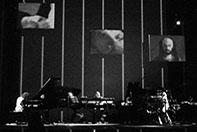
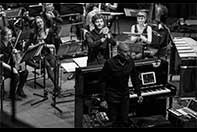
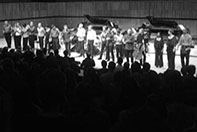
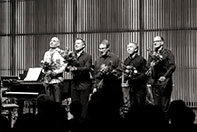
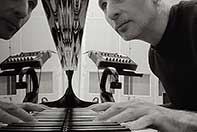
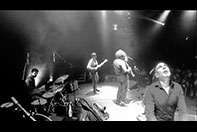
Nascent Forms
“In Dave Maric’s nature-inspired Nascent Forms for mallet instruments the emphasis on quick fire repetition was mesmerising in itself, the performance scintillating for its dextrous precision and intoxicating interaction.”
Ken Walton, Vox Carnyx, April 2024 [Full Article]
Decade Zero
“A true original and undoubtedly a highlight of the (London Jazz) festival.”
Martin Hummel, London Jazz News, November 2017 [Full Article]
“Phronesis’ mind expanding collaboration with composer Dave Maric and the Engines Orchestra, for the premiere of the daring and complex ‘Decade Zero’, offered an adrenalin rush of cerebral and sensuous sonic thrills.”
Peter Bacon, Jazz Wise Magazine (print version), May 2017
“Decade Zero, was an entirely absorbing 35 minute, multi-movement affair, making good use of the combined forces at Maric’s disposal. He has a real feel for Phronesis’ music, and achieved a rare balance between conventionally scored orchestral elements – bassoon and cello contributing especially nicely to the sound – and the trio’s jazz energy. Anton Eger on drums modulated perfectly from subtle orchestral accompanist to his trademark volcanic effusions as the score dictated. The piece will repay repeated listening.”
John Turney, London Jazz News, 30 April 2017 [Full Article]
“Phronesis’s collaboration with composer Dave Maric and the Engines Orchestra was a valuable co-commission, and another example of a mix where the sum of the parts really does add up.”
Peter Bacon, Jazz Wise Magazine, 2 May 2017 [Full Article]
“The Phronesis show at the Town Hall, with strings and woodwind from the Engines Orchestra, featured the world premier of a complex and stimulating new Maric work, Decade Zero.”
John Watson, Jazz Journal, 30 April 2017 [Full Article]
“Decade Zero was excellently conceived and realised, with tingling moments when the scored orchestral music rode the pulse of Anton Eger’s tumultuous drumming or a fluent clarinet pierced the Phronetic hubbub and a full range of musical textures was achieved.”
Tony Benjamin, Bristol 24/7, 2 May 2017 [Full Article]
“Maric’s writing was dense but interesting with a strong focus on both melody and rhythm and despite the chamber music elements it certainly wasn’t lacking in energy with Eger’s drums coming to the heart of the music in the final movement as the music built to a climax prior to an unexpectedly sombre coda. The piece received a great reception from the audience and Dave Maric came onto the stage to accept the acclaim alongside conductor Meadows and the musicians.”
Ian Mann, The Jazz Mann, 4 May 2017 [Full Article]
Trophic Cascades
“Dave Maric (1970) was commissioned to write a new work…He passed with flying colors. In the six-part Trophic Cascades he makes an ecological statement which places him in the company of composers such as Murray Schafer and John Luther Adams.”
Willem Jan Keizer, Cultuurpers, 27 February 2015 [Full Article]
“Trophic Cascades by Dave Maric is based on the British composer’s interest in biodiversity and ecosystems but the work is best appreciated for the enticing sound world that mixes high avant garde classicism with populist vernacular music. Mallet percussion solos suggest the sounds of the Javanese gamelan and the Dies Irae motif as well as strands of bebop and boogie-woogie make appearances.
Currie was a ball of fire moving between mallet percussion and thwacking drums and cymbals with Ramirez a steady, driving presence at the timpani. At times Currie took over as conductor, leading his colleagues through rhythmically complex sections. Skillfully conceived.”
Lawrence Budmen, South Florida Classical Review, 29 March 2015
Troglodytes Troglodytes (album)
“A trilling, buzzing, partly melodic thing that will cut right through the cacophony of your day and demand to be heard.”
Ian Sherred, The Sound Projector, 25 March 2015 [Full Article]
“The sound is oddly gothic, the howls and scratches of of Masing’s strings rubbing strangely along with Maric’s synth. I rather like it; I hear something of both Radulescu and 80s synth-pop in it (among much else), a combination of avant garde and trash that brings to mind the narrow streets of East London, appropriately enough where Vicious Circle do most of their performing.”
Tim Rutherford-Johnson, The Rambler, 10 December 2014 [Full Article]
“Caution is advised. Elo Masing and Dave Maric are boundless improvisatory eccentrics, blowing raspberries and throwing vicious scowls in the direction of moderation and self-assessment.”
ATTN Magazine, 27 November 2014 [Full Article]
“It’s the [musical] sideshow that I would love to see live…”
Hear and Now, BBC Radio 3, 11 October 2014
Sense and Innocence
2014 version
“the most all-embracing was Dave Maric’s Sense and Innocence”
Richard Fairman, Financial Times, 8 April 2014 [Full Article]
2002 version
“Currie for spare and spooky “Sense and Innocence”…melds well with Maric’s moody electronic sampling, and it was a crisp, thoughtful work.”
Luke Quinton, Austin 360, 24 February 2011 [Full Article]
“Perhaps the most engaging music came from English composer Dave Maric, a classical pianist whose wide tastes also include jazz, pop and electronic music. His eclecticism is fully evident in the 2002 Sense and Innocence, which combines a wide array of percussion with pre-recorded and sampled percussion sounds. Here, even more than in the 2001 Trilogy commissioned by Currie, there was an other-worldly atmosphere, sometimes vaguely tinted with funk, often deriving its forward energy from weird ostinatos, availing of countless sounds and colours, and all demonstrating the immense concentration and expressive control of the performer. “
Michael Dungan, The Irish Times, 19 June 2007
“Sense and Innocence inhabits a different world of sound. Using percussion and sampled percussion, for me, this is the highlight of the disc. The ethereal sounds of the opening are captivating and take on a new dimension. The music bursts into repeated riffs with a beat which is reminiscent of pop music and once again encourages dancing. The more upbeat sections are juxtaposed against bowed cymbals and electronically treated sounds, moving without warning from light into darkness. The return to the opening mood is all the more spooky, as a result of having interrupted the flow of the previous material. The performance is again flawless, to the extent that one is hardly aware of the performance, but instead drawn towards the musical world which it presents. At times, it is impossible to tell what is electronic and what is live; the sounds merge to form a unified whole. There is tremendous variety within this ten minute work, and I long to hear it in live performance. This is excellent music, superbly played.”
Carla Rees, Music Web International, 28 November 2007
Habitual Behaviour
“**** Composer Dave Maric cleverly developed the Phronesis sound with pre-composed electronica”
Mike Hobart, Financial Times, 8 April 2013 [Full Article]
“**** Dave Maric triggers bell-like arpeggios on a synth module, providing the basis for some fiendishly complex compositions.”
John Lewis, The Guardian, 8 April 2013 [Full Article]
Run Chime
“full of vitality and rhythmic and textural invention”
Jonathan Russell, Bachtrack, 11 November 2013 [Full Article]
“Run Chime was a great, cleverly-crafted, curtain-raiser.”
Andrew Patner, Chicago Sun-Times, 27 Februrary 2013 [Full Article]
Blood Wedding
“The doom-laden musical score by Dave Maric, with wonderful percussion flavours, carries the action and highlights major turning points.”
Jussi Tossavainen, Helsingin Sanomat, 31 October 2010 [Full Article]
“Dave Maric’s music paints a complex soundscape that gives structure to the drama.”
Jan-Peter Kaiku, Hufvudstadsbladet, 31 October 2010
“Blood Wedding by English choreographer Cathy Marston, director of the Berne Ballet, is full of drama and a feeling of inexorable fate from its first moments. This is prompted above all by the dark, percussion-laden music of Dave Maric.”
Annikki Alku, Uutispäivä Demari, 31 October 2010 [Full Article]
“The music for the production was commissioned from likewise British composer Dave Maric. The music carries the story and presents the dancers with a challenging underlay.”
Sara Nyberg, Keskisuomalainen, 31 October 2010
And our faces vanish like water
“in the experimental piece [And our faces vanish like water], in which the movements of the ensemble meet the sung statements of classical soprano (Mélanie Adami) and the Bern Beat boxer Steff La Cheffe, you feel a sudden crackle. Like fragments from different worlds, the energies of text, sound (Dave Maric) and different dance styles coalesce. “And our faces vanish like water” transforms into a whole range of options rich with quotations. There are Hotspots of strong emotional force; unpredictability is their strength.”
Marianne Mühlemann, Berner Zeitung, 1 February 2010 [Full Article]
27m²
“Film of the Festival”
European Independent Film Festival, April 2011 [Full Article]
Sturmhöhe (Wuthering Heights)
“David Maric’s score, for electronics and live double bass, is a meterological marvel with its high, sighing melodies and rumbling climaxes that threaten to burst into heavy rock but never do.”
Jenny Gilbert, Independent On Sunday, 31 May 2009 [Full Article]
“David Maric’s score – a blend of electronic sounds and live double-bass solos, played with concentrated passion by Mich Gerber – is hauntingly evocative, brilliantly echoing the vastness and menacing presence of Bronte’s infamous moors.”
Sarah Wilkinson, The Stage, 28 May 2009
“the music (Dave Maric) which evoke the moors with inspired simplicity and the dark relationships spookily well.”
Bruce Marriot, ballet.co.uk, May 2009 [Full Article]
“Maric’s score is suitably nervy and atmospheric”
Luke Jennings, The Observer, 31 May 2009 [Full Article]
“Dave Maric’s jagged score provides both meteorological mood and emotional daggers.”
Sarah Frater, Evening Standard, 28 May 2009
“Dave Maric’s music, scored for double bass and electronics, is an effective partner.”
Debra Craine, The Times, 29 May 2009
“The music, the work of Dave Maric and Mich Gerber, uses samples with live bass to make a fantastic envelope of sound, which clearly and confidently structures the dance into a classic three-acter.”
“Die Musik, das Werk von Dave Maric und Mich Gerber, lässt samples auf den live gespielten Kontrabass treffen für eine fantastische Klanghülle, die den Tanz souverän und klar strukturiert, als einen klassischen Dreiakter.”
Anna Hohler, Ballettanz magazine, May 2009
“And the music? It is a success. Dave Maric, who also composed Ghosts (created in 2005), has, in Wuthering Heights, expressed more concretely the echoes of nature and the stormy contrasting moods of the novel than the set. One hears the rustle of rain, the doors shaking from the storm, and all with the help of a single instrument: the contrabass.
Recorded sampled sounds (a “solo acoustic bass orchestra” according to the programme) provides the accompaniment, with Mich Gerber on the left front of the stage playing live. Magnificent. Maric, meanwhile, conducted in the background.
At the premiere on Saturday evening there were some gaps in the audience, but the applause was rapturous, and rightly so.”
Marlies Strech, Berner Zeitung, 30 March 2009 [Full Article]
“The Music of Dave Maric sharply contrasted with the simplicity of the staging. His combination of computer music sounds and mournful bass fits perfectly. Here the storm rages – the vanities, the feelings and the elements in the moors of Yorkshire.”
“Die Musik von Dave Maric kontrastiert scharf die Leichtigkeit der Inszenierung Seine Kombination von Computer-musik und traurigen Kontrabassklängen passt hervorragend. Hier tobt der Sturm – der Eitelkeiten, der Gefülhe und der Elemente im Hochmoor von Yorkshire.”
Bettina Bendiner, NEWS (BernerZeitung), 30 March 2009
“Maric, who in 2008 was composer for Marston’s production of Ghosts, interweaves the scraps of melodic and percussive patterns into a dynamic sound space which illustrates the seismographic emotions on the stage.”
Marianne Mühlemann, Der Bund, 30 March 2009
A Tale of Two Cities
“In collaboration with David Maric, whose score artfully soundpaints the action, Marston finds some clever choreographic routes through Dickens’ tortuous chronology, staging simultaneous scenes from past and present and doubling the moves so that they echo across the years.”
Judith Mackrell, The Guardian, 04 September 2008 [Full Article]
“Dave Maric’s fine original score provides the show with a sometimes suspenseful, unexpectedly delicate pulse.”
Donald Hutera, The Times, 04 September 2008 [Full Article]
“the combination of Dave Maric’s original score, so full of foreboding, and the expressive, diverse choreography consumes you.”
Charles Hutchinson, The Press, 06 September 2008 [Full Article]
“Maric’s score is luminous, painting the dance in richest colour, and is one of the finest new ballet scores I have heard, as good as that which Hans Werne Henze wrote for Ashton’s Ondine last century. The evening was a triumph – for Maric, for Marston – and especially for NBT, which has acquired a narrative ballet that does not sacrifice intelligence, nor craftsmanship and will give them (I hope) many splendid performances hence. It is Dickens truly ‘recalled to life.’”
Ian Palmer, ballet.co.uk, 07 September 2008 [Full Article]
“The final ten minutes or so, covering the escape and departure of the Darnays to England and the moments before Carton’s execution were quite heart-rending. And here I need to mention Dave Maric’s score. Beautifully supportive of the dance to this point, it now became positively noble, and I would be fascinated to know whether it could be expanded to a fuller symphonic scale without loss of effect. It follows, I hope, that NBT’s small orchestra had delivered this significant score effectively. (Significant? Arguably, yes – new full length ballet scores are hardly ten-a-penny these days in the UK.)”
Ian Macmillan, ballet.co.uk, 02 September 2008 [Full Article]
“David Maric’s modernistic score – with hints of Stravinsky, Beethoven and Mozart – perfectly complemented the choreography.”
Jim Greenhalf, Telegraph & Argus, 04 September 2008 [Full Article]
“The music, composed by Dave Maric, added enormously to the atmosphere on stage and produced a dimension of striking originality.”
Philip Seager, British Theatre Guide, October 2008 [Full Article]
“***** The original score by David Maric is very good indeed: atmospheric and varied in style – at one moment sweetly easy on the ear, at another starkly ominous and atonal as the Revolution approaches.”
RF, Fringe Review, 03 October 2008 [Full Article]
“The tone of the music is predominantly one of tension and foreboding in much of the first-half, reaching a climax of alarm as the revolution begins among a colourful flurry of tricolores. But composer Dave Maric varies the overall driving urgency of his score with gentler, more delicate themes when the action switches from Paris to London.”
Martin Fyles, digyorkshire, September 2008 [Full Article]
“And special mention has to be made to the rather chilling score which adds another sinister edge to a narrative which always seems to be edging perilously closer to an ominous conclusion.”
Rod McPhee, Leeds City Lite and Yorkshire Evening Post, 03 September 2008 [Full Article]
“**** Set to a new score – echoing Marston’s intentions by also fusing traditional influences and avant-garde impulses – by composer Dave Maric, Dickens’ French Revolution-set novel gives Marston and the excellent dancers a great imaginative stretch.”
Tina Jackson, Metro, 02 September 2008 [Full Article]
“It’s at moments like this when the importance of Dave Maric’s score is brought into sharp focus, underpinning the sinister prison scenes with a babble of brass and those set in a legal chamber with the gentle mockery of a flute.”
Susan Darlington, Morning Star, 10 September 2008 [Full Article]
Borrowed Time (CD)
“Classical CD of the week. “Music by Dave Maric”, the CD cover admits in faint print beneath Colin Currie’s name and the title of his disc, Borrowed Time. (It is even more discreet on the back of the CD.) This unusually modest admission as to the identity of a composer whose work fills the whole enterprise hides a man who has done a lot for the percussion world in the past few years in building a recital repertoire.
Dave Maric, a one-time pianist with the Steve Martland Band, has been composing professionally only since the turn of the millennium, but he has won commissions from such organisations as the Lucerne Festival and Radio France for music that combines rhythmic ingenuity with an ear for timbre.
None of the six pieces here is technically for a solo player: while four combine Currie with piano, trumpet, organ or a fellow percussionist, the other two pair him with pre-recorded, sampled percussion sounds. So anyone put off by the prospect of an hour of unadulterated “kitchen department” need have no fear.
Having said that, Maric does have a predisposition towards the marimba, which is the lead instrument in all the works, but it suits his melodic style, somewhat minimalist in effect with its constant revolutions through subtly evolving clusters of notes.
Musically speaking, the most successful of the collaborations are Lucid Intervals, with Håkan Hardenberger on flugelhorn and trumpet providing a lyrical foil to Currie’s tintinnabulations, and the title track, Borrowed Time, which enters the spacious acoustics of Westminster Abbey for a duo between bubbling percussion and largely static organ chords. The disc ends with the phosphorescent sounds of Trilogy, Maric’s first work for Currie.”
Matthew Rye, Daily Telegraph, 15 September 2007 [Full Article]
“SCOTS percussionist Colin Currie has long been a champion of Dave Maric’s music. Both men met through their shared connections with the Steve Martland Band, and there are shared allusions, too, in Maric’s jazz/rock-driven music which Currie performs with various artists in this stimulating disc. Who would ever have thought of combining percussion and church organ? Maric’s Borrowed Time connects the two brilliantly, Clive Driskill-Smith – on the organ of Westminster Abbey – playing a moody understated backing to Currie’s atmospheric solo line. There’s no shortage of big hitters. Fellow percussionist Sam Walton joins Currie in the frenetic rhythms of Shapeshifter; trumpeter Hakan Hardenberger adds a sultry flourish to Lucid Intervals; while Maric himself plays piano in the driving minimalism of Predicaments. If you’ve seen Currie live in these works, the recordings are no less spectacular. ***** “
Kenny Matheson , The Scotsman, 2 November 2007
“Musicians today are no longer obliged to rely on the received traditions of music college when presenting new work. Rather, they now work in a deregulated aesthetic environment where, say, the deployment of digital samples and the influence of jazz/trip-hop/Balinese gamelan/your non-classical music of choice must be addressed with as much rigour as traditional instrumental virtuosity or the conventions of the sonata form.
Given the baggage attendant on such freedom, it’s always reassuring to hear a disc like this which presents new music with such conviction.
Both Dave Maric and Colin Currie are alumni of trhe Steve Martland Band, a unit which was grappling with these issues before most people realised they existed, so theirs is a well-qualified collaboration. Their guest performers display equal commitment to this pleasingly varied set of compositions, which range from a gentle invocation of jazz chord structures (the first piece) to an ingenious three-section workout for live and sampled percussion (the last). This detailed, thoughtful music, mature in conception, confident in execution and impeccably recorded, is well worth your time.”
Performance ****
Sound *****
Roger Thomas, BBC Music Magazine, November 2007
“I loved this disc! Why the exclamation? Because it’s such a rare pleasure to hear contemporary music that is so well crafted, original and God forbid – immediately accessible. The fact that it’s so well performed and beautifully recorded as well is a bonus….If, like me, you generally shy away from percussion music, listen to this disc. It’s a real Mindshifter.”
Robert Levett, International Record Review, November 2007
‘Every solo percussionist, however brilliant, faces the same problem: how do you generate a repertory for yourself? In Dave Maric, Colin Currie has found a composing collaborator with an ideal range of skills. All six works here are for different duet-style combinations, with varied and listener-friendly soundworlds to match. The most striking creation is Borrowed Time itself, for percussion and organ – a surprising-sounding idea that really works. Håkan Hardenberger features on flugelhorn and trumpet in Lucid Intervals; and Maric himself plays in Predicaments for percussion and piano. Well worth exploring.’
Malcolm Hayes, Classic FM magazine, December 2007
“…this CD, is a series of contemporary works which are approachable and engaging, without being dumbed down in any way.”
Carla Rees, Music Web International, 28 November 2007
“warmly recommended. **** “
Caroline Dromey, Musical Criticism.com, 19 October 2007
Lucid Intervals
“In Dave Maric’s Lucid Intervals, the process was reversed, with Hardenberger initiating a sequence of commanding, almost baroque solos while Currie stooped over his instruments as if in acquiescent subservience. Enthralling stuff, every second of it.”
Tim Ashley, The Guardian, February 2007
“Lucid Intervals was written for Currie and Håkan Hardenberger for the Verbier Festival in 2006. …the sound is unified and both percussion and trumpet are deployed both melodically and to maintain the rhythmic flow….There is a strong rhythmic energy, perhaps as one would expect of a percussion CD…. Hardenberger’s reputation is such that one expects greatness, and he has not let us down here. His sound is rich, emotive and highly satisfying to listen to. The third movement of this piece is perhaps one of the most beautifully played trumpet lines I have ever heard.”
Carla Rees, Music Web International, 28 November 2007
“Just as effective, though in a completely different way, is the gorgeous three-movement work written for Currie (marimba, vibraphone and crotales) and Hardenberger (flugelhorn and trumpet), Lucid Intervals. Maric’s sparse, rarefied sound world is here matched by an extraordinarily sensitive response by both players. It’s just magic.”
Robert Levett, International Record Review, November 2007
Ghosts
(First Run: 22-25 September 2005, Linbury Theatre, Royal Opera House, London)
“An original score by Dave Maric for five musicians – strings, harp, clarinet and marimba – in a moody minimalist, percussive style, augmented by dark electric sounds…punctuates the action like a rapier and layers on the doom that surrounds all on stage.”
Bruce Marriot, Ballet.co.uk, 23 September 2005 [Full Article]
“Dave Maric’s score avidly played by a small ensemble, jabbing through the sticky atmosphere like a knife or marking the domestic tedium with a ticking pulse.”
Jenny Gilbert, The Independent on Sunday, 2 October 2005 [Full Article]
“Dave Maric’s haunting strings and percussion – perfectly echoing the dancers locked into neurotic fantasies of rampant libidos and smothering intimacy.”
Jeffery Taylor, Sunday Express, 25 September 2005
“Dave Maric’s original score, played live, makes effective use of viola, cello, harp, marimba and bass clarinet. Subtly supplemented by electronics, the music gives the dance its pulse.”
Donald Hutera, The Times, 26 September 2005 [Full Article]
“Ghosts is a compact, 60 min long individual reading of the drama,
set to appropriately haunting music by Dave Maric.”
Giannandrea Poesio, The Spectator, 1 October 2005
(Second Run: June 2006, Linbury Theatre, Royal Opera House, London)
“It was the organic freshness and the spirit of collaboration which so impressed me – Dave Maric’s astonishingly vivid score (so delicately orchestrated for marimba, harp, strings and clarinet and astutely conducted by David McCallum) pacing the dramatic trajectory so brilliantly and dressing the choreography in the most fitting of weeds. There is something uniquely special about the collaboration between composer and choreographer (a collaboration which surely reached its peak with Stravinsky and Balanchine) where each artist feeds off the other, energizing and refreshing themselves, learning from each other and ultimately creating a work of art which is so alive, so lucid, so thrilling.”
Ian Palmer, Ballet.co.uk, June 2006 [Full Article]
(Third run: April – June 2008, Stadttheater Bern, Switzerland)
“Fast-forward to the first-night proper and a first-rate performance, the inflections of Maric’s music matching those on stage and the result was choreographic bliss. “
Ian Palmer, Ballet.co.uk, 18 April 2008 [Full Article]
Borrowed Time
“Maric took pains to ensure that the organ writing was carefully subdued beneath the patterns that Currie played on marimba before shifting the balance gradually in the organ’s favour. And in the second half of the piece, where the vibraphone takes the marimba’s role in a kind of surreal echo, he achieved something genuinely atmospheric.”
Stephen Pettitt, Evening Standard, 11 June 2003
“The title track of the CD, Borrowed Time is another fascinating example of Maric’s work, with the somewhat unusual pairing of percussion and organ. Recorded at Westminster Abbey, the different acoustic gives a sense of space to this piece compared to the others on the disc, but it has been carefully balanced and the change is a welcome addition to the recording. The marimba dominates, with the organ’s bass notes giving support for the moving percussion above it. The organ part takes on a mostly accompanying role, emerging from the texture and then disappearing again to allow the percussion to take center-stage. It is a relationship that is highly effective and enchanting.”
Carla Rees, Music Web International, 28 November 2007
Predicaments
“The opening work is Predicaments…From the outset, we are taken on a journey into Dave Maric’s captivating sound-world. Even the slower paced opening of the first movement has energy and momentum which maintains the listener’s interest. The movement drives forwards towards syncopated piano chords, over which the percussion line demonstrates Currie’s more than impressive virtuoso technique. The second movement is faster, with a relentless driving semiquaver pulse. This is thrilling to listen to, with the playing having a sense of liquidity and ease, and the string rhythmic accents urging the listener to dance along. The piano here comes into its own, with impeccable evenness and clarity.”
Carla Rees, Music Web International, 28 November 2007
“The opening work, ‘Predicaments’, is another of the album’s highlights. Maric, on piano, adds subtle nuances with poignant chords beneath a responsive vibraphone. But the bombardment of sound(s) perhaps points to a broader problem: will the listener hear past the initially bewildering ‘surface’ of the music and be rewarded by repeated listens? The answer, categorically, is yes, if the listener bothers. This two-movement work draws on a swathe of instruments, but its two movements hold together excellently. With its postminimalist tendencies, ‘Deadlock’, the second movement, begins with a turbulent piano rhythm and accented melodic line but ultimately shines another light on Currie’s talent, that is, the exceptional virtuosity that first brought him to our attention. The movement engages the listener with its strident, polyrhythmic gestures.”
Caroline Dromey, Musical Criticism.com, 19 October 2007
Unspoken (album)
‘**** Pianist Katia Labèque’s current band brings together acoustic and electronic music in an inspired collaboration with New York percussionist Marque Gilmore and British composer Dave Maric. Their 2003 album, Unspoken, moves seamlessly between Labèque’s grand piano and Maric’s digital electronics. The writing is ambitious and dense without being laboured, and Labèque’s refined pianism lends a lyrical quality to Maric’s complex material.
In Breathe, the strongest track on the album, Maric introduced the touching device of a sampled second piano, which continued to sound like a memory after Labèque’s live playing had faded away. The live and sampled pianos interacted, and later when Labèque was given space to play alone she occupied it majestically. Once the band returned, you realised how much each member of this remarkable trio contributes, and how little they need special guests.’
David Lasserson, The Guardian, 30 November 2005 [Full Article]
‘… moody avant-fusion. The compositions by Dave Maric are extremely sophisticated and highly effective on their own terms.’
BBC Music Magazine, April 2004
‘This is mood music of an extremely sophisticated sort…an indelible fusion of free jazz, Latin American, modern country, and minimalist procedures, projected via exultant melodic arches and rhythmic twists that impart a compelling sense of direction to the various tracks. Mesmerising stuff.’
Classic fm Magazine, April 2004
‘…a curious, intriguing piece of electro-acoustic music. Scraps of minimalist laptop, shrouded in synth textures…Labèque’s crisp piano tone sounds magnificent throughout.’
Time Out, April 2004
‘Superbly Original’
The Independent , April 2004
‘breathless sections of wild piano, virtuoso synth bass and hustling drum kit, peppered with spontaneously triggered synth sounds and samples… stylish.’
John L Walters, The Guardian , April 2004
‘the music, mostly by Maric, is full of interesting textural contrasts and sudden shifts in dynamics or mood. The results veer giddily between elegant classical stylings, outbreaks of nu-jazz…an entertainingly cutting-edge jazz unit.’
The Times , April 2004
‘The results are wonderful, if amazingly difficult to compartmentalize – a genuinely fresh music. There’s a consistent beauty in the pieces… it is the sincerity of their collaboration that makes the Katia Labeque Band a truly mature new achievement.’
Venue , April 2004
‘Breathtaking from note one…Purely imaginative through and through…Truly a masterpiece in atmospheric, programmatic, and epic sound landscape.’
Tamara Turner, CD Baby, December 2003
Broken Fiction
“…This was set to music by Dave Maric, played live here by the ensemble Between the Notes (onstage). The instruments were an interesting mix (including cello, percussion, piano, electric guitar). Live music in this venue was a real plus, and it was good to see the musicians get such a warm response – it’s a strange, restrained haunting piece of music. “
Lynette Halewood , Ballet Magazine, December 2003
Exile
“Exile is an ingenious layering of subtle percussion over obsessive, inexorable piano rhythms. Maric cleverly uses core live electronics (eg sampled bowed vibraphone, gong scraped with metal, echoing eerie piano), which incidentally help link the percussionist’s discreet moves between instrument groups. Notable sweet, bell-like crotales contrast beautifully with delicate temple block patterns over ghostly disembodied recorded sounds.”
Maggie Cotton , Birmingham Post, 31 October 2002
“Exile is a lively, evocative, complex piece that incorporates the sounds of music from around the world and the styles of Western art music. It works chronologically backward, starting with minimalist gestures and moving to a stately, Bach-like section before returning to the opening energy. But what were then starts and stops now become tight and continuous. If the title is meant to evoke a desolate image, the ending suggests triumph.”
Chris Pasles , Los Angeles Times, 25 January 2003
Falling to the Sky
“Commissioned by Mullova and Labèque, this three-movement work is a bold and imaginative take on the potential of each instrument, bonding them close together in discourse which is compelling for the audience. Static works out cunning and stark abstracts of duetting and self-duetting from a skeleton of a Dies Irae-type theme; Endless plays with baroque and folk figures; and Hyper dances both soloists off their feet. “
Hilary Finch , The Times, 28 June 2002
“On Friday night, the Russian violinist Viktoria Mullova played a recital at Carnegie Hall, with the French pianist Katia Labeque….”Falling to the Sky.”…has three movements: Static, Endless, and Hyper. Mr. Maric is true to his descriptions, in each case. The second movement gives the impression of continuity in space – and, frankly, it, too, is hyper, although not as hyper as the third movement. “Falling to the Sky” is a clever composition, and I will pay it a high compliment: I would like to hear it again.”
Jay Nordlinger , New York Sun, 18 April 2005
Shapeshifter
“Dave Maric’s Shapeshifter was a typically challenging, inventive piece for marimbas and percussion, bursting with ideas, protean in its moods-from laid-back and easygoing to huge outbursts of driving energy-all put together with real brain-power and inspiration, and capped with a supremely effective chordal sequence at the end. Dazzling playing throughout….”
Michael Tumelty, Glasgow Herald, 18 October 2003
“Shapeshifter is a standout track, an extremely impressive example of putting percussion to experimental use, creating complicated rhythms and, through their combination, teasing out structural references.”
Caroline Dromey, Musical Criticism.com, 19 October 2007
Trilogy
“The virtuosic Currie, catalyst for so many new works, was mostly to be seen behind a construction of marimba, vibraphone, kick drum, gongs and all kinds of arcane objects, sounding extraordinary and no doubt identifiable only to members of the inner lodge of the percussion world. Dave Maric’s Trilogy (2001), a beguiling piece written for Currie, required 22 instruments, as well as a pre-recorded soundtrack.”
Fiona Maddocks, The Observer, 16 November 2014 [full article]
“Maric’s piece pitted a solo percussionist against a dancing pre-recorded track of percussion sounds, so dense and full it could almost have stood on its own – which isn’t to deny Colin Currie astounding virtuosity, spinning on his heel from the marimba to the vibraphone placed behind him in mid-beat, while playing a bass-drum with his foot. The man is simply a marvel.”
Ivan Hewett, The Telegraph, 12 November 2014 [full article]
“The pianist from Horses of Instruction, Dave Maric, was the composer of Trilogy, a work for solo percussionist with a backing soundtrack of further percussion instruments, electronically enhanced. This is a showpiece which Colin Currie played from memory on 22 instruments, often several at the same time. The live music was seamlessly co-ordinated with the taped part, and the effect was of Currie duetting with himself. The music was engaging, clearly influenced by Martland and, to a lesser extent, Steve Reich.”
Bernard Hughes, The Arts Desk, 12 November 2014 [full article]
“Percussion soloist Colin Currie was the headliner, and deservedly so with a virtuoso performance of British composer Dave Maric’s first and final movements of Trilogy for solo live and sample percussion. With Currie playing against and with an acoustic track, the first feel was funky pulsating dynamism taking you to a range of percussive places you hadn’t known existed. The virile excitement of the final movement recalled hearing Steve Reich for the first time.”
Rita Kohn, nuvo.net, 21 March 2011 [full article]
“It’s a real tour de force, with a striking (forgive the pun), funky opening movement that is followed by a kind of slow movement with an oriental flavour and an exciting final movement that often recalls Steve Reich. It’s really quite sensational and one understands why it was such a success.”
Robert Levett, International Record Review, November 2007
“The big showpiece was left till last – the first performance of Dave Maric’s sensational Trilogy for live and sampled percussion. Its language is expansive, pulsating, dynamic and virile.”
Kenneth Walton, The Scotsman, 4 December 2000
“…hard-edged, punchy beat (irresistible), the stomping rhythms, and the pulverising drive. Not that it was all in-yer-face stuff: there were enormous subtleties woven through it. But the total effect of the whole piece was overwhelming, genuine orchestral textures built out of a battery of live and sampled sounds”
Michael Tumelty, Glasgow Herald, 2 December 2000